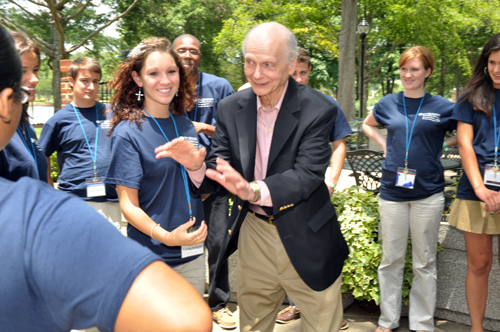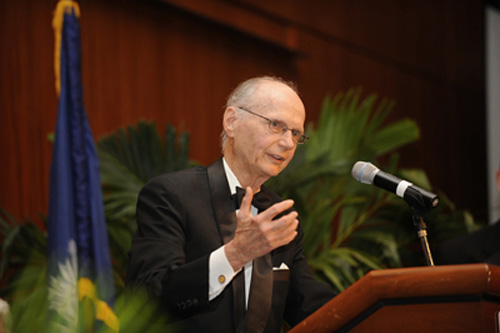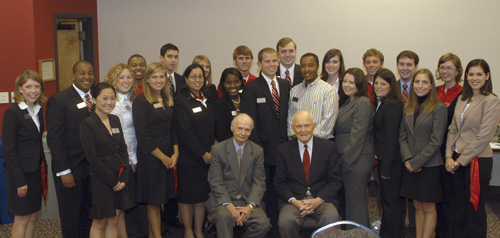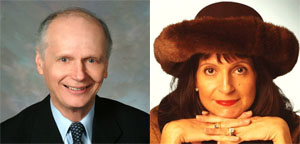
"The low-income schools that are struggling seem to get the teachers that are not the best. The states have to change that situation and put the priority on placing the top teachers in low-income schools."
-- Dick Riley
The last presidential debate offered little in the way of focus on education and related policy. Today in The Global Search for Education series, I continue my conversations with education luminaries to discuss the issues that we believe will be a priority for the next President of the United States.
My imaginary Secretary of Education this week is former U.S. Secretary of Education and past Governor of South Carolina, Richard Wilson Riley. A lifelong advocate for high-quality education, many Americans (according to The Christian Science Monitor) regard Riley as "one of the great statesmen of education of the 20th century." Serving for both of President Clinton's terms, Riley helped to launch many historic initiatives to raise academic standards, improve instruction for the poor and disadvantaged, modernize schools, expand grant and loan programs for higher education, and improve teaching, among other significant advances.
Currently, Dick Riley speaks, provides leadership and serves in an advisory and collaborative capacity with many entities to promote education improvement in the United States and abroad.
What should the role of federal government be in K- 12 education? How much more funding should be given to education reform and in what major areas should it be spent?
The federal government should establish national priorities, such as helping disabled children (IDEA) and low-income children (Title 1). Those big national priorities that generally are funded by the federal government should continue to be part of the national policy.
The other part of national education policy should be about encouraging and challenging states to improve and to reform education through innovation. We should continue to call for challenging academic standards in core subjects, allowing public charter schools as part of choice, encouraging high teacher performance - those kinds of things are part of the President's reform package. All of those measures should be put in place by the states. The states should be submitting plans for getting those things done. So that's how I see the role of federal government policy.
Continuing to fund education during a time of economic recession is one of the main strengths of President Obama. In the middle of a recession that was not of his making, a recession that was handed to him when he took office as president, Obama made education a priority. He recognized that this is a knowledge-based economy, not just nationally, but globally. He recognized that we could not turn around an economy if our education system was failing. He took the initiative to prioritize education. I thought and still think that this was a brave and courageous thing to do. And, frankly, I think it has worked.
What would be your position on improving the teaching profession, including recruitment, teacher training, compensation, and assignment to low-income schools?
I have enormous respect for teachers. Not all of our teachers are high-quality teachers but certainly the greater percentages of them are. Further, they generally are committed to moving through all the areas of education reform, such as technology. So I have a very good feeling for teachers.
Countries that seem to rank highest in education right now, like Finland, have prioritized teacher recruitment. They get the very top students for the education profession. They do this by offering higher compensation and other benefits. It works. I think we need to do more in that regard, particularly in terms of finding ways to attract the brightest students to the profession of teaching.
I do not think teachers are being compensated as professionals, and they should be. When you pay teachers more, you can demand more. Also, I am a strong believer in the benefit of teachers working collaboratively with each other. I believe in high-quality teachers helping to improve those that are not. I do not believe in putting one teacher in the classroom and saying that's it, you're on your own. When teachers work in teams, students also will learn the importance and value of working in teams.
Right now we seem to send our best teachers to the best K-12 schools. The low-income schools that are struggling seem to get the teachers that are not the best. The states have to change that situation and put the priority on placing the top teachers in low-income schools. It would be a great help if we could move in that direction.

"I firmly oppose vouchers. Public schools are struggling for resources and I believe the idea of shifting a massive amount of money over into the private schools is a mistake." -- Dick Riley
What kinds of things could the states do to make this happen?
For instance, a school in a poor community could provide a residence for a young, high-quality teacher to live in that community. Other incentives could be provided to encourage better teachers to move into low-income school areas. And assistance could be provided for current teachers in low-income schools to gain National Board certification and other professional development to improve their teaching skills.
What would be your position on school choice, including charter schools and their expansion, private schools, vouchers, and investment in inadequately staffed and facilitated low-income schools?
I very much support public school charters. As you know, I was involved in the Clinton administration and we supported charter schools as an option for school boards to develop more public school choice and more school creativity. As with opening any new school, granting a charter does not automatically guarantee success; but generally it has proven to be a good option for students and families, as well as has spurred other creative ideas within the system.
I firmly oppose vouchers. Public schools are struggling for resources and I believe the idea of shifting a massive amount of money over into the private schools is a mistake. I support quality private schools. I support quality parochial schools. But I will continue to oppose strongly the use of public money for private or parochial school vouchers.
What would be your strategy to address the domestic and international achievement gaps, including your position on early childhood education, standardized testing, on-line modular education, and teacher/principal accountability?
Achievement gaps are a major issue, and we need to deal with them.
First of all, I believe we need to look at both domestic and international comparisons in terms of setting our standards and our strategies for improvement.
The only way you can close gaps in the long term is to invest more in early childhood education. All students improve as they move through the system. However, the gap becomes very difficult to close, or even narrow, when local communities don't make pre-school a priority. Early childhood education involves a lot of things, including parental involvement and proper healthcare to ensure children are better developed by the time they get to kindergarten. We need to focus on this, especially in low-income areas. I very much support strengthening early childhood education.
With regard to standardized testing, that is very important. But we need multiple measures of assessment to determine a child's (and school's) academic status and growth. Formative tests that are given on a regular basis and provide timely feedback to teachers, students and their parents are particularly effective in determining what a child knows or doesn't know and how that child's instruction should be adjusted to gain continuous improvement.
Evaluating teachers and principals has always been difficult and it's receiving a lot of discussion nowadays, as it should. I believe that student achievement, especially as far as improvement is concerned, is an important part of evaluating teachers. However, I do not believe that it should be the only method of assessment used. A thoughtful school principal will look at all the different factors that affect good teaching. He or she will develop a system within the school where teachers are collaborating and helping each other to do better, a system where students are learning from students. Observing a teacher's work in the classroom (either sitting in or using videos) and assigning mentors to work with teachers on teaching methods are other ways that performance can improve.
Evaluating a teacher also depends a lot on who the students are. A teacher with very bright students in a well-to-do suburb is more likely to achieve more in the classroom than a teacher who has students from a very poor neighborhood where the parents (who possibly didn't have a good education themselves) are struggling. It's very hard to compare teachers in these situations. I am a great believer in looking at individual student improvement rather than how students are doing side by side. If the students are improving, my feeling is the teacher must be doing a pretty good job.

"I do not think teachers are being compensated as professionals, and they should be. When you pay teachers more, you can demand more." -- Dick Riley
What would be your position on curriculum reform, including the role of the arts, the treatment of ethics, and the adoption of blended online learning?
Technology is now clearly a part of our education system and will continue to change the way we provide education today and in the future. I personally like the blended learning ideas - that is, a blend of online and face-to-face interaction with students. Online learning allows us to reach out in many ways. In addition, it can be done quickly, from any location and at all times of the day. Blended learning will be an important part of education.
I strongly support music and the other arts in education. Enhancing the creative side of learning is extremely important, and studies have shown that music instruction has a beneficial effect on learning math and other core subjects. Learning to be creative, informed and well-rounded is important for our economy and it is important for our world.
Ethics is a very important part of growing up and learning. Parents have a strong role to play in that but so do schools and teachers. Positive role models are one of the best ways to illustrate strong ethics.
What would be your position on how to make college affordable for more qualified low-income students?
The cost of a college education is becoming a big national problem.
I am supportive of early college high schools. This idea of students finishing high school with one and in some cases two years of college behind them will save students money and time. The total cost of a four-year degree also can be reduced by spending the first two years at a community or technical college. This is good.
In President Obama's plan, he encourages cost containment by colleges and universities. I think they all should be aware of this, paying attention to it and doing something about it. Pell grants, which the President has increased by more than 50%, are a tremendous benefit to low-income students. Also, significant cost savings to students, their families and all taxpayers have resulted from the federal Direct Lending program. With the community colleges and early college high schools programs, plus cost containment, Pell grants and Direct Lending, among others, we all should be able to work together to make college more affordable.

Dick Riley and C. M. Rubin
Photos courtesy of Riley Institute at Furman University and Nelson, Mullins, Riley & Scarborough L.L.P.
In The Global Search for Education, join me and globally renowned thought leaders including Sir Michael Barber (UK), Dr. Michael Block (US), Dr. Leon Botstein (US), Professor Clay Christensen (US), Dr. Linda Darling-Hammond (US), Dr. Madhav Chavan (India), Professor Michael Fullan (Canada), Professor Howard Gardner (US), Professor Andy Hargreaves (US), Professor Yvonne Hellman (The Netherlands), Professor Kristin Helstad (Norway), Jean Hendrickson (US), Professor Rose Hipkins (New Zealand), Professor Cornelia Hoogland (Canada), Mme. Chantal Kaufmann (Belgium), Dr. Eija Kauppinen (Finland), State Secretary Tapio Kosunen (Finland), Professor Dominique Lafontaine (Belgium), Professor Hugh Lauder (UK), Professor Ben Levin (Canada), Lord Ken Macdonald (UK), Professor Barry McGaw (Australia), Shiv Nadar (India), Professor R. Natarajan (India), Dr. Pak Tee Ng (Singapore), Dr. Denise Pope (US), Sridhar Rajagopalan (India), Dr. Diane Ravitch (US), Sir Ken Robinson (UK), Professor Pasi Sahlberg (Finland), Andreas Schleicher (PISA, OECD), Dr. Anthony Seldon (UK), Dr. David Shaffer (US), Dr. Kirsten Sivesind (Norway), Chancellor Stephen Spahn (US), Yves Theze (Lycee Francais US), Professor Charles Ungerleider (Canada), Professor Tony Wagner (US), Sir David Watson (UK), Professor Dylan Wiliam (UK), Dr. Mark Wormald (UK), Professor Theo Wubbels (The Netherlands), Professor Michael Young (UK), and Professor Minxuan Zhang (China) as they explore the big picture education questions that all nations face today.
The Global Search for Education Community Page
C. M. Rubin is the author of two widely read online series for which she received a 2011 Upton Sinclair award, "The Global Search for Education" and "How Will We Read?" She is also the author of three bestselling books, including The Real Alice in Wonderland.
